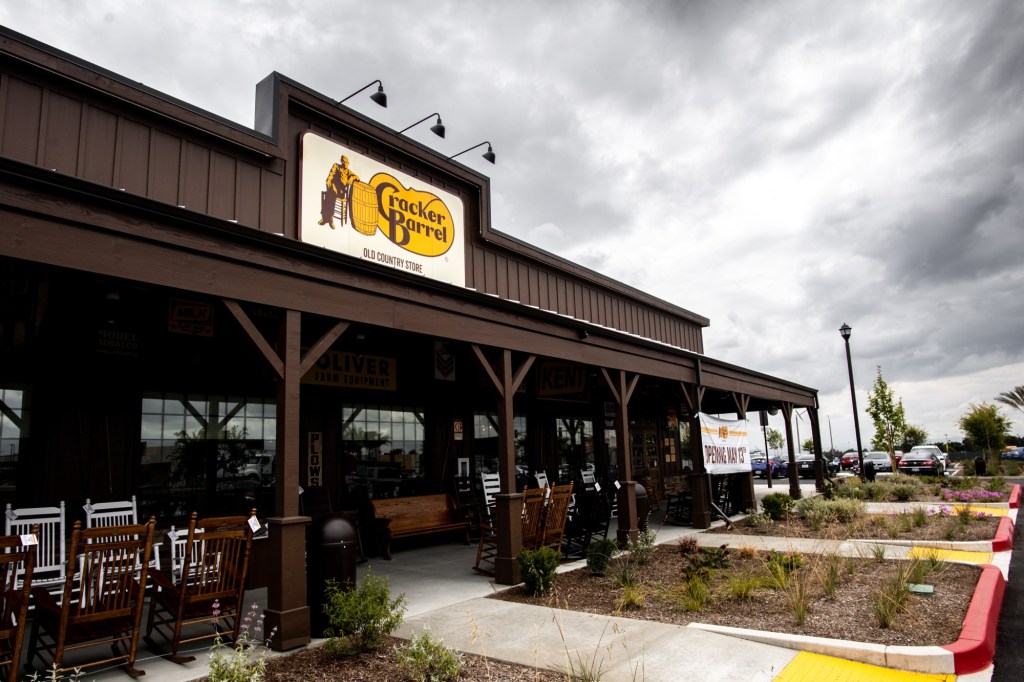
SACRAMENTO—The “(bad word) your feelings crowd” is an oddly sensitive lot, as these folks are triggered by innocuous slights. As an editor, I appreciate concern about typesetting. I just never expected so many people, including U.S. senators, to lose their composure over Helvetica Bold. But here we are as they got agitated over the font on Cracker Barrel’s attempted sign change—and the removal of a drawing of “Old Timer” sitting by the barrel.
The Tennessee-based restaurant chain last week capitulated to public outrage and ditched its simplified sign logo. Donald Trump even took a break from blaming Ukraine for the audacity of having gotten itself invaded. The president blasted Cracker Barrel for the proposed change and then took credit for the reversal. We’re making country fried steak great again.
This is the latest exhibit—for those who needed yet another one—that the America that created the world’s greatest experiment in limited government, and won the Second World War (and not by negotiations, Mr. Vice President) is no longer a serious country. The entire world is grappling with this frightening reality.
In Russia, our new apparent ally, 48% of rural households don’t have indoor toilets. Despite drops in poverty rates over recent decades, one-third of African children face malnutrition. A quarter of the world’s population live (daily) on less than the price of a Cracker Barrel apple-pie slice. But in the one-time beacon of freedom and prosperity, peasants with pitchforks stormed the gates of a mediocre chain restaurant because of a sign change and a failed Chip and Joanna-style remodel. Important stuff.
That said, I love interesting business stories, especially ones that involve bone-headed suits who have lost touch with their customer base. Few examples top the Coca-Cola Co.’s decision in 1985 to replace its traditional Coke recipe with New Coke, which tasted more like Pepsi. The public was up in arms because a beloved company was messing with the taste of a product it loved. It wasn’t about trumped up “protect our culture” nonsense, as if Cracker Barrel’s cheesy logo dating to 1977 has deep cultural significance rivaling the Liberty Bell.
A recent and comparably idiotic corporate story involves Stellantis, the European-based company that owns the American icons of Dodge, Chrysler, RAM and Jeep. Dodge Chargers were fairly popular despite being outdated thanks largely to their reputation for providing affordable muscle. They were powered by a decent V-6 engine and most notably, the company’s high-horsepower Hemi V-8s. Dodge seemed to understand its old-school customer niche.
Then the company inexplicably revamped the Charger into a high-priced electric vehicle—and sales dropped so dramatically that Stellantis is hurriedly bringing back the internal-combustion models and slashing prices on the EVs. How can companies be so clueless? I can’t imagine a company with customers less likely to embrace EVs than Dodge.
So I kind-of understand why Cracker Barrel customers were unhappy (although it didn’t mess with the recipes)—but I can’t grasp why it became a line in the sand in the culture war. There’s no indication that there was anything political about the decision, yet conservative snowflakes acted as if it were part of a nefarious leftist plot to replace fried chicken with tofu and sell Gavin Newsom autographed T-shirts in the country store alongside its candies and trinkets.
In a free-market, companies can make their own business decisions and consumers can patronize—or not patronize—them for whatever reason they choose. That includes politics, sure. I once refused to shop at a store because of an eminent-domain dispute, but after a time I realized my “boycott” inconvenienced me more than it mattered to the company. Trying to politicize everything usually just makes my head hurt.
Republicans apparently no longer care much about free markets or property rights, as evidenced by their support for Trump’s government effort to grab equity in some companies, but I had hoped most of them would be wise enough to pick their battles more carefully. After the logo controversy started, Cracker Barrel’s stock dropped a few bucks, but has moved upward after its reversal. The real story is the company’s stock was at nearly $132 in 2020 and is at around $54 now—and it was simply trying, however club-footedly, to lure new customers.
We’re long accustomed to left-wing cancel culture, with the “Sydney Sweeney Has Great Jeans” ad somehow becoming—in the fevered minds of progressive social-justice warriors—a dog-whistle for white supremacy and eugenics. Such snowflakes are exhausting, but the Right is now playing the same game. So every stupid little piffle that shouldn’t concern us now becomes a scorched-earth campaign in the culture war.
Come on, if you’re genuinely celebrating Cracker Barrel’s decision to restore the old sign, then you’re either a real stickler for editorial details or, more likely, are so deep into the rabbit hole that you might need an intervention.
Steven Greenhut is Western region director for the R Street Institute and a member of the Southern California News Group editorial board. Write to him at sgreenhut@rstreet.org.



